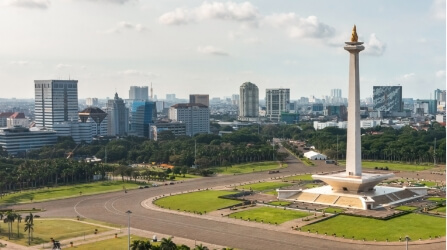Introduction: Southeast Asia’s Crown Jewel
If you’re planning to expand to Indonesia, you’re targeting one of Southeast Asia’s most dynamic and rewarding markets. With over 270 million people and a fast-growing economy, Indonesia offers unmatched opportunities for regional business growth.
For Singapore-based companies and regional SMEs looking to scale, the decision to expand to Indonesia is more than just a growth opportunity—it’s a strategic necessity.
Indonesia: A Giant in the Region
Indonesia is the fourth most populous country in the world and the largest economy in Southeast Asia. With a GDP of over USD 1.4 trillion and consistent annual growth, it’s no surprise that more and more international businesses are setting their sights on Indonesia.
According to the World Bank, Indonesia is expected to be among the top 5 global economies by 2045, driven by urbanisation, digital transformation, and a rising middle class.
Unlike saturated markets, Indonesia still has significant room for growth, especially in areas like consumer goods, digital services, healthcare, education, and manufacturing.
Why Now Is the Right Time to Expand to Indonesia
Timing matters in business expansion—and the time to enter Indonesia is now. Several key factors make it an ideal moment to explore this vibrant market:
a. Rapid Digital Growth
Indonesia is home to over 200 million internet users. Mobile-first behavior dominates, with e-commerce, fintech, and social media adoption growing at double-digit rates annually.
This trend opens doors for tech startups, SaaS providers, online education platforms, and retail brands looking to tap into digitally savvy consumers.
b. Middle-Class Boom
Indonesia’s middle class is growing rapidly. According to McKinsey, by 2030, around 135 million Indonesians will be part of the consuming class. That means greater demand for quality products, modern retail, financial services, healthcare, and lifestyle brands.
c. Economic Reforms
The government has implemented pro-business policies, including the Omnibus Law, to attract foreign investors and simplify the business setup process. These reforms reduce red tape and offer greater ease of doing business.
Market Size Meets Market Gap
Indonesia isn’t just big—it’s under-served in many categories, making it fertile ground for innovative businesses.
For example:
-
In healthcare, there’s a lack of access to quality private providers in second-tier cities.
-
In education, demand for international curricula and digital learning is skyrocketing.
-
In consumer goods, demand is shifting toward value-for-money, ethical, and premium brands.
This dynamic creates opportunities to capture early market share in sectors where demand is high, but supply is limited.
4. Key Sectors for Expansion
Here are some of the industries with the highest growth potential for companies looking to expand to Indonesia:
a. Consumer Goods & Retail
From FMCG to fashion, Indonesian consumers are increasingly brand-conscious. Modern retail formats—like minimarkets, e-commerce, and malls—are spreading rapidly even in suburban and rural areas.
b. Fintech & Digital Services
Indonesia has a large unbanked population and is shifting quickly to mobile-based financial services, including payments, lending, and insurance. Fintech solutions are solving real pain points in this landscape.
c. Education & Upskilling
There’s a growing need for vocational training, online courses, and international-standard education, especially post-pandemic. B2B and B2C edtech solutions are in high demand.
d. Healthcare & Wellness
Public healthcare access remains a challenge, creating room for private clinics, diagnostics, dental services, and wellness products. Aging demographics and increased awareness are further driving this market.
e. Sustainability & Clean Tech
Indonesia is moving towards a greener economy, with government and business investments in renewable energy, waste management, and sustainable agriculture.
The Challenges You May Face When Expand to Indonesia
Despite the opportunity, companies that expand to Indonesia often face challenges that can delay or derail success:
-
Regulatory Complexity: Foreign ownership restrictions, licensing, and taxation laws vary by sector and region.
-
Cultural Differences: Trust, hierarchy, and relationship-building play a major role in business. Misunderstandings can hurt deals.
-
Fragmented Market: With over 17,000 islands and varying infrastructure quality, logistics and distribution require careful planning.
-
Local Competition: Indonesian consumers often prefer local brands that “get them.” Without localization, foreign brands may struggle to resonate.
To succeed, businesses must go beyond surface-level research and engage with local partners, market insights, and compliance advisors.
The Importance of Local Expertise
Entering Indonesia requires more than just exporting products or services. You need to:
-
Navigate local laws and incentives
-
Identify the right entry mode (distributor, JV, local entity)
-
Understand consumer behavior
-
Build partnerships with trusted stakeholders
A local partner like Ciptamata can guide you through this process—from feasibility studies to on-ground execution—so you avoid mistakes and seize the best opportunities.
How the MRA Grant Can Support Your Expansion
For Singaporean businesses looking to expand to Indonesia, the Market Readiness Assistance (MRA) Grant offers a fantastic head start.
The MRA Grant covers up to 50% of eligible costs, including:
-
Market research and feasibility studies
-
Legal and regulatory advisory
-
Branding and marketing support
-
Overseas business development
This means your expansion project becomes more financially viable—while reducing the risks of entering a new market.
Ciptamata is an experienced partner in MRA-funded projects, helping businesses maximize the grant’s value and comply with EnterpriseSG requirements.
Success Factors When Expanding to Indonesia
To truly thrive in Indonesia, here are some proven strategies:
-
Localize your branding and messaging: What works in Singapore may not land the same way in Jakarta or Surabaya.
-
Hire local talent or advisors: They offer insights you won’t find in reports.
-
Choose partners wisely: Vet them not just for credentials, but also cultural fit.
-
Be ready to iterate: Market dynamics can shift fast. Flexibility is key.
-
Focus on long-term relationships: Building trust takes time, but pays off in loyalty and reputation.
Real-Life Example: A Successful Market Entry Story
A regional retail brand approached Ciptamata in 2023 to explore Indonesian expansion. They had strong products but limited knowledge of local regulations, consumer behavior, or distribution networks.
Ciptamata conducted:
-
Market sizing and trend analysis
-
Regulatory checks for importation and product labeling
-
Partner matching with reputable distributors
-
Localized brand positioning for Gen Z consumers
Within 12 months, the brand entered Greater Jakarta and Bandung, secured a national retail chain, and saw 20% MoM sales growth in its first quarter.
Why Choose Ciptamata as Your Market Entry Partner
Ciptamata is more than a consultancy—we’re your on-the-ground team in Indonesia. Our services include:
-
Market research and competitor benchmarking
-
Entry strategy development
-
Legal and compliance advisory
-
Distributor or JV partner sourcing
-
Marketing localization
-
Ongoing growth strategy
We’ve helped dozens of businesses from Singapore and the region expand to Indonesia with confidence.
Conclusion: Don’t Wait to Expand to Indonesia
Indonesia is no longer an “emerging market” it’s a dominant force in Southeast Asia, and it’s ready for your business.
If you’re planning to scale in the region, there’s no better time to expand to Indonesia. With the right insights, preparation, and support, your brand can unlock immense growth potential and build lasting success.
Ready to explore opportunities in Indonesia?
Let Ciptamata guide your next move.
Contact us today to get started.











